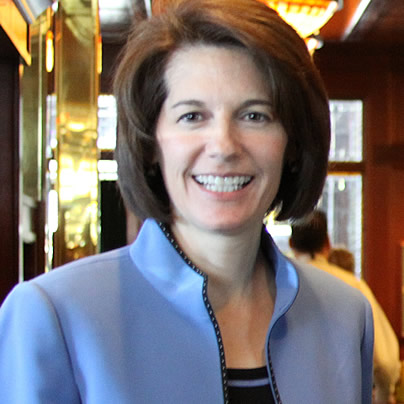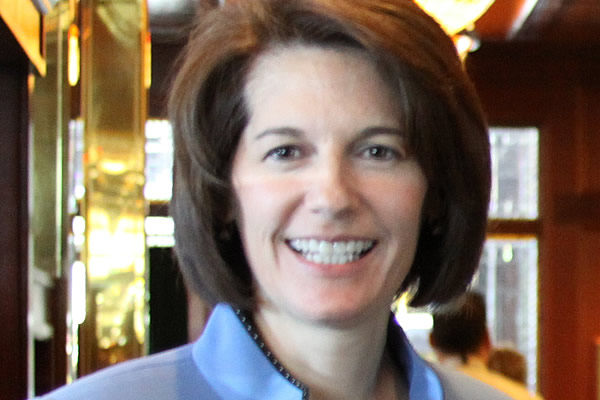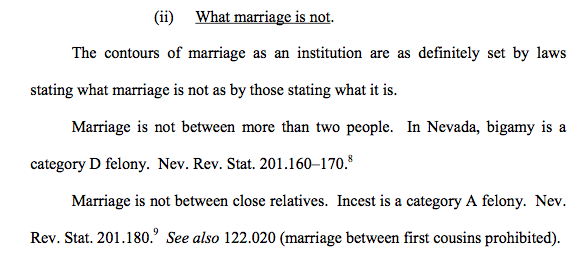News
Nevada AG invokes bigamy, incest to defend marriage ban
State interest is ‘to protect and perpetuate traditional marriage’

Ask the attorney general of Nevada about the definition of marriage, and she’ll tell you it doesn’t include the union of a same-sex couple. But in the same breath, she’ll tell you it also doesn’t include incest or bigamy either.
In a 55-page brief filed on Tuesday, Nevada Attorney General Catherine Cortez Masto urges the U.S. Ninth Circuit Court of Appeals to uphold the state’s constitutional ban on same-sex marriage on the basis that it reflects the will of the people.
“The interest of the State in defining marriage in this manner is motivated by the state’s desire to protect and perpetuate traditional marriage,” Masto writes. “In establishing this criterion and others — e.g., age, consanguinity, unmarried status, etc. — the state exercises its prerogative as a State, and that exercise is entitled to respect.”
But in a section titled “Marriage Defined” explaining “what marriage is” and “what marriage is not,” Masto reminds the court that in addition to not being for same-sex couples under Nevada law, marriage is also not for those engaging in bigamy or incest.
The invocation of bigamy and incest in Nevada’s brief before the Ninth Circuit recalls the first legal brief the Obama administration filed in support of the Defense of Marriage Act when it was still defending the law in court. That brief invoked bigamy and pedophilia to assert the constitutionality of the ban on federal recognition of same-sex marriage, which riled LGBT advocates.
Evan Wolfson, president of Freedom to Marry, took Masto to task for making an implicit comparison between same-sex marriage and bigamy or incest while saying she makes no solid argument against allowing gay nuptials in Nevada.
“Marriage is not ‘defined’ by who is denied it, and nothing in the brief explains why loving and committed couples of the same sex should be denied the legal commitment and bundle of obligations and protections that are available to different-sex couples,” Wolfson said. “To invoke bigamy and incest, as the attorney general does — at least she stopped short of bestiality! — doesn’t supply an explanation; it makes clear that the state has nothing to offer to justify the discrimination against same-sex couples in Nevada.
But Wolfson said he concurs with another argument within the attorney general’s brief: domestic partnerships, which are permitted under Nevada law, aren’t equivalent to and don’t provide a substitute for marriage.
The brief was filed in the case of Sevcik v. Sandoval, a challenge filed by Lambda Legal against Nevada’s ban on same-sex marriage in 2012.
Jon Davidson, Lambda’s legal director, said “of course, we find any such comparison objectionable” between same-sex marriage and bigamy or incest. The organization is slated to file its formal response to the attorney general’s brief next month.
Masto is a Democrat and has served in the role of attorney general for Nevada since 2007. Other Democrats holding the office in other states — most recently Virginia Attorney General Mark Herring — have elected not to defend marriage bans in the state on the basis that they’re unconstitutional.
Notably, Masto argues at length that the Ninth Circuit shouldn’t apply heightened scrutiny, or a greater assumption a law is unconstitutional, to the ban on same-sex marriage. That argument is somewhat dated after the Ninth Circuit on Tuesday applied heightened scrutiny in ruling that a juror cannot be excluded from a trial based on sexual orientation — a decision that will have precedent in the marriage case.
“Under an objective application of due process and equal protection analyses, there is no basis for heightened review of the State’s purpose in defining marriage by its traditional meaning,” Masto writes. “There exists neither fundamental right, nor suspect or quasi- suspect class, justifying a different standard of review.”
But the invocation of bigamy and incest isn’t the only part of the brief that is raising concerns among LGBT advocates.
Responding to the various friend-of-the-court briefs filed in the case on behalf of same-sex marriage, Masto takes issue with the way some say marriage is about children and others say it isn’t.
“There is some irony in the inconsistency in certain arguments made by amici,” Masto writes. “A brief by the Family Equality Council, et al., posits that the policy issue is primarily about children, presenting ‘testimonials from the children raised in such families [those with same-sex parents].’ In a separate brief, Family Law Professors (who are ‘scholars of family law’) argue that marriage is not about children.”
Masto concludes these divergent views on the role of children in marriage serve to “reinforce the conclusion that the state’s legislature is the democratic crucible where the issues should be debated and decided.”
Emily Hecht-McGowan, the Family Equality Council’s director of public policy, slammed the attorney general for her interpretation of its brief in favor of marriage equality.
“The Attorney General is missing the primary point of our Voices of Children brief, which is not that marriage is primarily about children but rather that the denial of marriage equality fundamentally harms children being raised by same-sex couples by rendering them and their families second-class citizens,” Hecht-McGowan said. “We trust that the Justices reading our brief and hearing oral arguments will reach the same conclusion that Justice Kennedy reached in his majority opinion in U.S. v. Windsor — that laws denying marriage recognition to same-sex couples ‘humiliate children’ and are a violation of equal protection under the law.”
Virginia
Arlington LGBTQ bar Freddie’s celebrates 25th anniversary
Owner asks public to support D.C.-area gay bars

An overflowing crowd turned out Sunday night, March 1, for the 25th anniversary celebration of Freddie’s Beach Bar, the LGBTQ bar and restaurant located in the Crystal City section of Arlington, Va.
The celebration began as longtime patrons sitting at tables and at the bar ordered drinks, snacks, and full meals as several of Freddie’s well-known drag queens performed on a decorated stage.
Roland Watkins, an official with Equality NoVa, an LGBTQ advocacy organization based in the Northern Virginia areas of Arlington, Alexandria, and Fairfax County, next told the gathering about the history of Freddie’s Beach Bar and the role he said that owner Freddie Lutz has played in broadening the bar’s role into a community gathering place.
“Twenty-five years ago, opening a gay bar in Arlington was not a given,” Watkins told the crowd from the stage. “It took courage, convincing, and a deep belief that our community belongs openly, visibly, and proudly,” he said. “And that belief came from Freddie.”
Watkins and others familiar with Freddie’s noted that under Lutz’s leadership and support from his staff, Freddie’s provided support and a gathering place for LGBTQ organizations and a place where Virginia elected officials, and candidates running for public office, came to express their support for the LGBTQ community.
“Over the past 25 years, Freddie’s has become more than a bar,” Watkins said. “It has become a community maker.”
Lutz, who spoke next, said he was moved by the outpouring of support from long-time customers. “Thank you all so much for coming tonight and thank you all so much for your support over the past 25 years,” he said. “I can’t tell you how much that means to me and how much it’s kept me going.”
But Lutz then said Freddie’s, like many other D.C. area gay bars, continues to face economic hard times that he said began during the COVID pandemic. He noted that fewer customers are coming to Freddie’s in recent years, with a significant drop in patronage for his once lucrative weekend buffet brunches.
“So, I don’t want to be the daddy downer on my 25-year anniversary,” he said. “But this was actually the worst year we’ve ever had,” he added. “And I guess what I’m asking is please help us out. Not just me, but all the gay bars in the area.” He added, “I’m reaching out and I’m appealing to you not to forget the gay bars.”
Lutz received loud, prolonged applause, with many customers hugging him as he walked off the stage.

The Comings & Goings column is about sharing the professional successes of our community. We want to recognize those landing new jobs, new clients for their business, joining boards of organizations and other achievements. Please share your successes with us at [email protected].
Congratulations to Gil Pontes III on his recent appointment to the Financial Advisory Board for the City of Wilton Manors, Fla. Upon being appointed he said, “I’m honored to join the Financial Advisory Board for the City of Wilton Manors at such an important moment for our community. In my role as Executive Director of the NextGen Chamber of Commerce, I spend much of my time focused on economic growth, fiscal sustainability, and the long-term competitiveness of emerging business leaders. I look forward to bringing that perspective to Wilton Manors — helping ensure responsible stewardship of public resources while supporting a vibrant, inclusive local economy.”
Pontes is a nonprofit executive with years of development, operations, budget, management, and strategic planning experience in 501(c)(3), 501(c)(4), and political organizations. Pontes is currently executive director of NextGen, Chamber of Commerce. NextGen Chamber’s mission is to “empower emerging business leaders by generating insights, encouraging engagement, and nurturing leadership development to shape the future economy.” Prior to that he served as managing director of The Nora Project, and director of development also at The Nora Project. He has held a number of other positions including Major Gifts Officer, Thundermist Health Center, and has worked in both real estate and banking including as Business Solutions Adviser, Ironwood Financial. For three years he was a Selectman, Town of Berkley, Mass. In that role, he managed HR and general governance for town government. There were 200+ staff and 6,500 constituents. He balanced a $20,000,000 budget annually, established an Economic Development Committee, and hired the first town administrator.
Pontes earned his bachelor’s degree in political science from the University of Massachusetts, Dartmouth.
Kansas
ACLU sues Kansas over law invalidating trans residents’ IDs
A new Kansas bill requires transgender residents to have their driver’s licenses reflect their sex assigned at birth, invalidating current licenses.

Transgender people across Kansas received letters in the mail on Wednesday demanding the immediate surrender of their driver’s licenses following passage of one of the harshest transgender bathroom bans in the nation. Now the American Civil Liberties Union is filing a lawsuit to block the ban and protect transgender residents from what advocates describe as “sweeping” and “punitive” consequences.
Independent journalist Erin Reed broke the story Wednesday after lawmakers approved House Substitute for Senate Bill 244. In her reporting, Reed included a photo of the letter sent to transgender Kansans, requiring them to obtain a driver’s license that reflects their sex assigned at birth rather than the gender with which they identify.
According to the reporting, transgender Kansans must surrender their driver’s licenses and that their current credentials — regardless of expiration date — will be considered invalid upon the law’s publication. The move effectively nullifies previously issued identification documents, creating immediate uncertainty for those impacted.
House Substitute for Senate Bill 244 also stipulates that any transgender person caught driving without a valid license could face a class B misdemeanor, punishable by up to six months in jail and a $1,000 fine. That potential penalty adds a criminal dimension to what began as an administrative action. It also compounds the legal risks for transgender Kansans, as the state already requires county jails to house inmates according to sex assigned at birth — a policy that advocates say can place transgender detainees at heightened risk.
Beyond identification issues, SB 244 not only bans transgender people from using restrooms that match their gender identity in government buildings — including libraries, courthouses, state parks, hospitals, and interstate rest stops — with the possibility for criminal penalties, but also allows for what critics have described as a “bathroom bounty hunter” provision. The measure permits anyone who encounters a transgender person in a restroom — including potentially in private businesses — to sue them for large sums of money, dramatically expanding the scope of enforcement beyond government authorities.
The lawsuit challenging SB 244 was filed today in the District Court of Douglas County on behalf of anonymous plaintiffs Daniel Doe and Matthew Moe by the American Civil Liberties Union, the ACLU of Kansas, and Ballard Spahr LLP. The complaint argues that SB 244 violates the Kansas Constitution’s protections for personal autonomy, privacy, equality under the law, due process, and freedom of speech.
Additionally, the American Civil Liberties Union filed a temporary restraining order on behalf of the anonymous plaintiffs, arguing that the order — followed by a temporary injunction — is necessary to prevent the “irreparable harm” that would result from SB 244.
State Rep. Abi Boatman, a Wichita Democrat and the only transgender member of the Kansas Legislature, told the Kansas City Star on Wednesday that “persecution is the point.”
“This legislation is a direct attack on the dignity and humanity of transgender Kansans,” said Monica Bennett, legal director of the ACLU of Kansas. “It undermines our state’s strong constitutional protections against government overreach and persecution.”
“SB 244 is a cruel and craven threat to public safety all in the name of fostering fear, division, and paranoia,” said Harper Seldin, senior staff attorney for the ACLU’s LGBTQ & HIV Rights Project. “The invalidation of state-issued IDs threatens to out transgender people against their will every time they apply for a job, rent an apartment, or interact with police. Taken as a whole, SB 244 is a transparent attempt to deny transgender people autonomy over their own identities and push them out of public life altogether.”
“SB 244 presents a state-sanctioned attack on transgender people aimed at silencing, dehumanizing, and alienating Kansans whose gender identity does not conform to the state legislature’s preferences,” said Heather St. Clair, a Ballard Spahr litigator working on the case. “Ballard Spahr is committed to standing with the ACLU and the plaintiffs in fighting on behalf of transgender Kansans for a remedy against the injustices presented by SB 244, and is dedicated to protecting the constitutional rights jeopardized by this new law.”




















